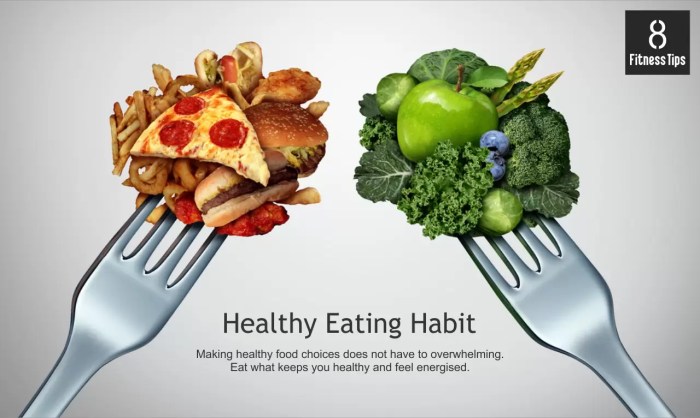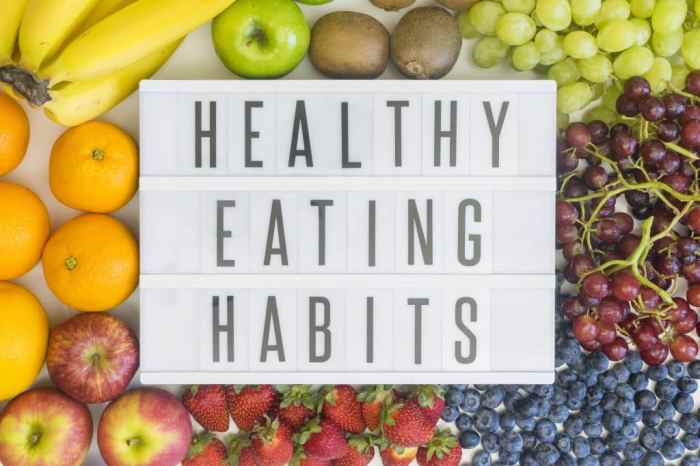With Healthy Eating Habits at the forefront, get ready to dive into a world of nutritious goodness and tasty tips that will have you feeling like the ultimate health guru. From fruits to veggies, we’ve got the inside scoop on how to upgrade your eating game and boost your wellness to the max.
Ready to rock your plate with some serious flavor and feel-good vibes? Let’s dig in and discover the secrets to a healthier, happier you through the power of delicious and nutritious foods.
Benefits of Healthy Eating Habits

Eating a variety of fruits and vegetables is crucial for maintaining a healthy lifestyle. These colorful foods are packed with essential vitamins, minerals, and antioxidants that support overall well-being and help prevent chronic diseases.
Incorporating Fruits and Vegetables
- Fruits and vegetables are rich in fiber, which aids in digestion and helps you feel full longer, reducing the risk of overeating.
- These foods are low in calories but high in nutrients, making them a perfect choice for weight management and overall health.
- The vitamins and minerals in fruits and vegetables support immune function, skin health, and energy levels.
Impact of a Balanced Diet, Healthy Eating Habits
- A balanced diet consisting of lean proteins, whole grains, fruits, vegetables, and healthy fats promotes optimal health by providing the body with essential nutrients.
- It helps maintain a healthy weight, reduces the risk of chronic diseases like heart disease, diabetes, and certain cancers.
- Proper nutrition supports brain function, mood regulation, and overall mental well-being.
Essential Nutrients for Healthy Eating
- Protein is essential for building and repairing tissues in the body, including muscles, skin, and organs.
- Omega-3 fatty acids found in fish and nuts support heart health and brain function.
- Calcium is crucial for bone health and plays a role in muscle function and nerve transmission.
Tips for Developing Healthy Eating Habits

To develop healthy eating habits, it is essential to focus on meal planning, portion control, and mindful eating practices.
Meal Planning for Nutritious Choices
- Plan your meals in advance to ensure you have balanced options available.
- Include a variety of fruits, vegetables, whole grains, lean proteins, and healthy fats in your meals.
- Consider batch cooking or meal prepping to save time and make healthier choices throughout the week.
Significance of Portion Control
- Avoid oversized portions by using smaller plates and bowls to help regulate serving sizes.
- Pay attention to serving sizes listed on food labels to prevent overeating.
- Practice mindful eating by eating slowly and savoring each bite to prevent mindless overeating.
Benefits of Mindful Eating Practices
- Helps you tune in to your body’s hunger and fullness cues, preventing overeating.
- Encourages you to enjoy and appreciate the flavors and textures of your food.
- Reduces stress and promotes better digestion by eating in a calm and relaxed state.
Common Obstacles to Healthy Eating
To maintain healthy eating habits, individuals often face various obstacles that can hinder their progress towards a balanced diet. These obstacles can range from time constraints and unhealthy food cravings to difficulties in making healthier choices when dining out or traveling. Overcoming these challenges is crucial for long-term health and well-being.
Time Constraints
One of the most common obstacles to healthy eating is the lack of time to prepare nutritious meals. Busy schedules and hectic lifestyles can lead to relying on fast food or processed meals, which are often high in unhealthy fats, sugars, and sodium.
- Plan ahead and meal prep on weekends to have healthy options ready during the week.
- Opt for quick and easy recipes that require minimal ingredients and preparation time.
- Use time-saving kitchen gadgets like slow cookers or instant pots to streamline meal preparation.
Unhealthy Food Cravings
Cravings for unhealthy foods can sabotage efforts to eat well-balanced meals. Junk food cravings are often triggered by stress, emotions, or even habits developed over time.
- Stock up on healthy snacks like fruits, nuts, or yogurt to satisfy cravings in a nutritious way.
- Practice mindful eating by paying attention to hunger cues and choosing healthier alternatives to satisfy cravings.
- Allow yourself occasional treats in moderation to prevent feeling deprived and prevent binge eating later on.
Making Healthier Choices When Dining Out or Traveling
Eating out or traveling can present challenges in sticking to healthy eating habits, as restaurant meals and fast food options tend to be high in calories, fats, and sugars.
- Look for restaurants that offer healthier menu options like salads, grilled proteins, or vegetable-based dishes.
- Ask for dressings and sauces on the side to control portion sizes and reduce added calories.
- Choose water or unsweetened beverages instead of sugary drinks to cut down on empty calories.
Impact of Healthy Eating on Mental Health
Eating a nutritious diet not only benefits your physical health but also plays a crucial role in maintaining good mental well-being. The food we consume can have a direct impact on our mood, cognitive function, and overall mental health.
Nutrients and Mental Well-being
Eating foods rich in certain nutrients can positively affect our mental health. For example, omega-3 fatty acids found in fatty fish like salmon and walnuts have been linked to improved mood and cognitive function. These healthy fats are essential for brain health and can help reduce symptoms of depression and anxiety.
Foods for Brain Health and Emotional Balance
1. Berries: Blueberries, strawberries, and other berries are rich in antioxidants that protect brain cells from damage and improve cognitive function.
2. Leafy greens: Spinach, kale, and other leafy greens are high in vitamins and minerals that support brain health and help regulate mood.
3. Nuts and seeds: Almonds, chia seeds, and flaxseeds are great sources of healthy fats, vitamins, and minerals that promote brain function and emotional balance.
4. Dark chocolate: Dark chocolate contains flavonoids that can improve blood flow to the brain and enhance cognitive function.
Remember, a well-balanced diet rich in fruits, vegetables, whole grains, lean proteins, and healthy fats is key to supporting your mental health and well-being.